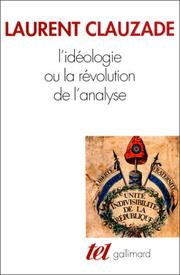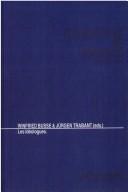| Listing 1 - 9 of 9 |
Sort by
|
Book
ISBN: 0231051301 9780231051309 Year: 1984 Publisher: New York (N.Y.): Columbia university press,
Abstract | Keywords | Export | Availability | Bookmark
 Loading...
Loading...Choose an application
- Reference Manager
- EndNote
- RefWorks (Direct export to RefWorks)
Social sciences --- Liberalism --- Idéologues (French philosophers) --- History --- Ideologues (French philosophers) --- -Liberalism --- -Social sciences --- -Behavioral sciences --- Human sciences --- Sciences, Social --- Social science --- Social studies --- Civilization --- Liberal egalitarianism --- Liberty --- Political science --- Philosophers --- -History --- -Idéologues (French philosophers) --- -Idéologues (French philosophers). --- Idéologues (French philosophers). --- Behavioral sciences --- Social sciences - France - History - 18th century --- Social sciences - France - History - 19th century --- Liberalism - France - History - 18th century --- Liberalism - France - History - 19th century
Book
ISBN: 3825309177 Year: 2000 Volume: 18
Abstract | Keywords | Export | Availability | Bookmark
 Loading...
Loading...Choose an application
- Reference Manager
- EndNote
- RefWorks (Direct export to RefWorks)
Categories (Philosophy) --- Categorieën (Filosofie) --- Catégories (Philosophie) --- Connaissance [Théorie de la ] --- Epistemologie --- Epistemology --- Epistémologie --- Ideologen (Franse filosofen) --- Ideologie --- Ideologues (Franse filosofen) --- Ideologues (French philosophers) --- Ideologues (Philosophes français) --- Ideology --- Idéologie --- Kenleer --- Kennisleer --- Kennistheorie --- Kentheorie --- Knowledge [Theory of ] --- Theorie of knowledge --- Theorievorming --- Théorie de la connaissance --- Idéologues (French philosophers) --- Science --- Philosophy. --- Idéologues (French philosophers). --- Idéologues (French philosophers) --- Normal science --- Philosophy of science --- Philosophers --- Philosophy
Book
ISBN: 9782849902035 Year: 2012 Publisher: Paris Editions des Malassis
Abstract | Keywords | Export | Availability | Bookmark
 Loading...
Loading...Choose an application
- Reference Manager
- EndNote
- RefWorks (Direct export to RefWorks)
Book
ISBN: 9780228016588 Year: 2023 Publisher: Montreal McGill-Queen’s University Press
Abstract | Keywords | Export | Availability | Bookmark
 Loading...
Loading...Choose an application
- Reference Manager
- EndNote
- RefWorks (Direct export to RefWorks)
"The French Revolution swept away the Old Regime along with many of its ideas about epistemology, history, society, and politics. In the intellectual ferment that followed, debates about religion figured prominently as diverse thinkers grappled with the philosophical and civil status of religion in a post-revolutionary age. Arthur McCalla demonstrates the central place of religion in the intellectual life of post-revolutionary France in Religion and the Post-Revolutionary Mind. Certain questions--What is the nature of religion? Does society rest on religious foundations? What ought to be the place of religion in society?--drew sustained attention from across the political spectrum. Idéologues viewed religion as error and sought to eradicate it through the promotion of secular values. Catholic Traditionalists understood religion as a body of revealed truths of supernatural origin that ought to be authoritative in all aspects of life. Liberals sought to replace Christian orthodoxy with a new public faith consonant with liberal values. But these blocs were not monolithic, and McCalla reveals the complexities of each one, as well as the dialogues and rivalries among them. The categories established by the concepts of religion these thinkers constructed continue to shape debates over liberationist critiques, liberal pluralism, laïcité, and political theology. The place of religion in civil society is again a matter of urgent debate. Religion and the Post-Revolutionary Mind provides essential historical context for thinking about the status of religion in the contemporary world."--
Religion and sociology --- Philosophy and religion --- Religion and politics --- Catholic traditionalist movement --- Idéologues (French philosophers) --- Liberalism (Religion) --- Religion --- History --- Historiography --- France --- Intellectual life

ISBN: 207075037X 9782070750375 Year: 1998 Volume: 292 Publisher: Paris: Gallimard,
Abstract | Keywords | Export | Availability | Bookmark
 Loading...
Loading...Choose an application
- Reference Manager
- EndNote
- RefWorks (Direct export to RefWorks)
Ideology --- Idéologues (French philosophers) --- Philosophy, French --- Idéologie --- Idéologues (Philosophes français) --- Philosophie française --- Idéologues (French philosophers) --- Idéologie --- Idéologues (Philosophes français) --- Philosophie française --- CDL --- 1 --- Philosophers --- Knowledge, Theory of --- Philosophy --- Political science --- Psychology --- Thought and thinking
Multi
ISSN: 22627057 ISBN: 9782859447557 2859447555 9791035107802 Year: 2013 Volume: 5 Publisher: Paris: Publications de la Sorbonne,
Abstract | Keywords | Export | Availability | Bookmark
 Loading...
Loading...Choose an application
- Reference Manager
- EndNote
- RefWorks (Direct export to RefWorks)
La philosophie française, sans guillemets, ça n’existe pas. Le présent ouvrage tente d’élucider les conditions dans lesquelles, dans la période post-révolutionnaire, l’investigation philosophique, directement investie dans les transformations de la société, a revêtu les formes singulières qui ont conduit à l’identifier comme « française ». Ce phénomène complexe est examiné à partir d’exemples empruntés aux principaux courants de pensée qui, de la Première République (Sieyès) à la Troisième (Barni), ont alimenté le débat d’idées au cours du xixe siècle, à savoir le conservatisme (Bonald, Maistre, Chateaubriand), le rationalisme (les Idéologues, Cousin, Renan) et le socialisme (l’école saint-simonienne, Proudhon). Mais en réfléchissant à la constitution de ces trois idéologies, on en vient à interroger la constitution du concept même d’« idéologie ». Et ce qui se découvre ainsi, c’est notre histoire, celle dont nous sommes d’autant plus tributaires que nous l’ignorons.
Philosophy, French --- Philosophy, Modern. --- Ideology. --- Idéologues (French philosophers) --- Philosophie française --- Philosophie moderne --- Idéologie --- Idéologues (Philosophes français) --- Idéologues (French philosophers) --- Philosophie française --- Idéologie --- Idéologues (Philosophes français) --- Philosophy, French. --- 1800-1899 --- socialisme --- XIXe siècle --- France --- philosophie --- rationalisme --- idéologie --- conservatisme --- idéologues --- abbé Sieyès --- Jules Barni
Book
ISBN: 2847883819 2847885994 Year: 2013 Publisher: ENS Éditions
Abstract | Keywords | Export | Availability | Bookmark
 Loading...
Loading...Choose an application
- Reference Manager
- EndNote
- RefWorks (Direct export to RefWorks)
What can we today read the ideologues, those thinkers who reconfigured the field of knowledge at the beginning of the XIX th century? The discovery of an ideological moment. This moment is the one that sees a radicality of the Enlightenment split between various disciplinary branches, between various conceptions of subjectivity and emancipation. The ideological moment is a moment of passage, but above all of decantation. We see emerging there, although still intertwined and united, what we are used to distinguishing: Enlightenment and romanticism, rationalism and feeling, radicalism and conservatism, necessity and voluntarism, colonialism and thirst for otherness, science and literature.
Idâeologues (French philosophers) --- Literature and science --- French literature --- Ideology and literature --- Philosophy & Religion --- Philosophy --- History --- Social aspects --- Political aspects --- Literature and ideology --- Poetry and science --- Science and literature --- Science and poetry --- Literature --- Science and the humanities --- Ideologues (French philosophers) --- Philosophers --- histoire de la philosophie --- idéologie --- sciences humaines --- Idéologues (French philosophers) --- French literature. --- Ideology and literature.

ISBN: 1283328569 9786613328564 9027279403 9789027279408 9027232822 9789027232823 Year: 1986 Volume: 12 Publisher: Amsterdam: Benjamins,
Abstract | Keywords | Export | Availability | Bookmark
 Loading...
Loading...Choose an application
- Reference Manager
- EndNote
- RefWorks (Direct export to RefWorks)
Le présent volume réunit les contributions d'un colloque sur la pensée sémiotique et linguistique des Idéologues qui s'est tenu à Berlin du 3 au 5 octobre 1983. Ce recueil d'articles fait suite à un fascicule de la revue Histoire Epistémologie Langage qui était consacré au même sujet et dont il complète et amplifie les perspectives en ce qui concerne la portée européenne de la discussion. Le volume manifeste l'intérêt que beaucoup d'entre nous portent, surtout dans les sciences du langage, à ces philosophes longtemps négligés par l'histoire de la pensée.
Linguistics --- Language and languages --- Language policy --- Idéologues (French philosophers) --- Philosophers --- Glottopolitics --- Institutional linguistics --- Language and state --- Languages, National --- Languages, Official --- National languages --- Official languages --- State and language --- Communication policy --- Language planning --- Linguistic science --- Science of language --- History --- Philosophy --- Government policy --- Foreign languages --- Languages --- Anthropology --- Communication --- Ethnology --- Information theory --- Meaning (Psychology) --- Philology --- Congresses --- Philosophy&delete& --- History&delete& --- Linguistique --- Langage et langues --- Politique linguistique --- Idéologues (Philosophes français) --- Histoire --- Congrès --- Philosophie --- Semiotics --- History of philosophy --- Comparative linguistics --- Philosophy of language --- French language --- anno 1700-1799 --- France --- Ideologues (French philosophers) --- Linguistics - France - History - Congresses --- Language and languages - Philosophy - Congresses --- Language policy - France - History - Congresses --- Idéologues (French philosophers) - Congresses --- Congresses.
Book
ISBN: 2600000089 Year: 1993 Volume: 328 Publisher: Genève Droz
Abstract | Keywords | Export | Availability | Bookmark
 Loading...
Loading...Choose an application
- Reference Manager
- EndNote
- RefWorks (Direct export to RefWorks)
Ideologen (Franse filosofen) --- Ideologues (Franse filosofen) --- Ideologues (French philosophers) --- Ideologues (Philosophes français) --- 1 DESTUTT DE TRACY, ANTOINE LOUIS CLAUDE --- 800.1 --- Ideology --- -Language and languages --- -Foreign languages --- Languages --- Anthropology --- Communication --- Ethnology --- Information theory --- Meaning (Psychology) --- Philology --- Linguistics --- Knowledge, Theory of --- Philosophy --- Political science --- Psychology --- Thought and thinking --- Filosofie. Psychologie--DESTUTT DE TRACY, ANTOINE LOUIS CLAUDE --- Taalfilosofie --- History --- -History --- Destutt de Tracy, Antoine Louis Claude comte --- -Filosofie. Psychologie--DESTUTT DE TRACY, ANTOINE LOUIS CLAUDE --- 800.1 Taalfilosofie --- 1 DESTUTT DE TRACY, ANTOINE LOUIS CLAUDE Filosofie. Psychologie--DESTUTT DE TRACY, ANTOINE LOUIS CLAUDE --- -800.1 Taalfilosofie --- Foreign languages --- Language and languages --- Philosophy&delete& --- Destutt de Tracy, Antoine Louis Claude, --- De Tracy, Antoine Louis Claude Destutt, --- Tracy, Antoine Louis Claude Destutt, --- Tracy, Destutt, --- Destutt Tracy, --- Destutt de Tracy, A. L. C.,
| Listing 1 - 9 of 9 |
Sort by
|

 Search
Search Feedback
Feedback About UniCat
About UniCat  Help
Help News
News